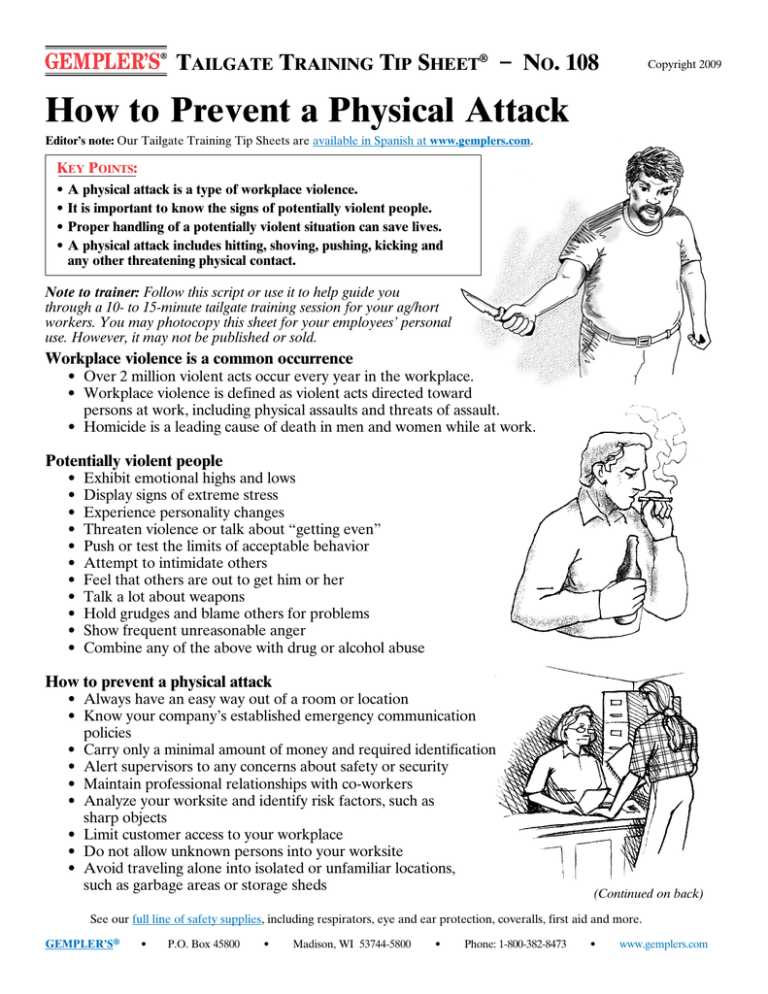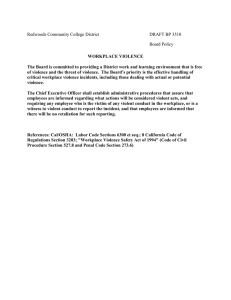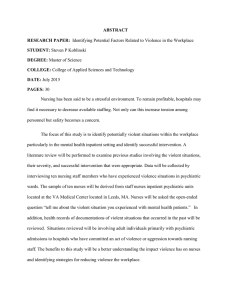How to Prevent a Physical Attack
advertisement

Tailgate Training Tip Sheet® – No. 108 Copyright 2009 How to Prevent a Physical Attack Editor’s note: Our Tailgate Training Tip Sheets are available in Spanish at www.gemplers.com. Key Points: • A physical attack is a type of workplace violence. • It is important to know the signs of potentially violent people. • Proper handling of a potentially violent situation can save lives. • A physical attack includes hitting, shoving, pushing, kicking and any other threatening physical contact. Note to trainer: Follow this script or use it to help guide you through a 10- to 15-minute tailgate training session for your ag/hort workers. You may photocopy this sheet for your employees’ personal use. However, it may not be published or sold. Workplace violence is a common occurrence • Over 2 million violent acts occur every year in the workplace. • Workplace violence is defined as violent acts directed toward persons at work, including physical assaults and threats of assault. • Homicide is a leading cause of death in men and women while at work. Potentially violent people • • • • • • • • • • • Exhibit emotional highs and lows Display signs of extreme stress Experience personality changes Threaten violence or talk about “getting even” Push or test the limits of acceptable behavior Attempt to intimidate others Feel that others are out to get him or her Talk a lot about weapons Hold grudges and blame others for problems Show frequent unreasonable anger Combine any of the above with drug or alcohol abuse How to prevent a physical attack • Always have an easy way out of a room or location • Know your company’s established emergency communication policies • Carry only a minimal amount of money and required identification • Alert supervisors to any concerns about safety or security • Maintain professional relationships with co-workers • Analyze your worksite and identify risk factors, such as sharp objects • Limit customer access to your workplace • Do not allow unknown persons into your worksite • Avoid traveling alone into isolated or unfamiliar locations, such as garbage areas or storage sheds (Continued on back) See our full line of safety supplies, including respirators, eye and ear protection, coveralls, first aid and more. GEMPLER’S® • P.O. Box 45800 • Madison, WI 53744-5800 • Phone: 1-800-382-8473 • www.gemplers.com Tailgate Training Tip Sheet® – No. 108 (continued) Copyright 2009 How to Prevent a Physical Attack Reducing Anger • Showing empathy for an upset person can help to reduce a tense situation. • Be willing to consider others’ view points in a mild tone. This creates a no blame situation where the upset person feels they have options. • Phrases to use – I will check into this right now – This is important – Thank you for letting me know this – I understand you have a concern – Let me take some notes • Phrases to avoid – That’s a lie – You don’t know what you’re talking about – I may have to call the police – You should have known – I can’t control that How to handle a physical attack • Stay calm and use anger reducing language • Maintain eye contact as a sign of respect • Increase your physical space by taking a step back • Create a physical barrier between you and the aggressive person, such as a counter or table • Adopt a formal language style, such as Mr. Smith • Lower your voice • Do not turn your back • Signal or call for assistance, when you feel the situation has escalated and you can do so safely • Never try to grab a weapon • Watch for a safe chance to escape to a safe area • Never touch the individual or try to remove him from the area Note to trainer: Briefly review your company’s policies for reporting and handling violent or potentially violent behavior. Are there any questions? Note to trainer: Take time to answer trainees’ questions. Then review the Workplace Violence Do’s and Don’ts. WORKPLACE VIOLENCE DO’S AND DON’TS DO: • Know the characteristics of violent people. • Properly report all violent situations. • Take steps to prevent workplace violence, such as using anger reducing phrases. DON’T: • Yell at someone who is yelling at you. • Carry large amounts of money or other valuables at work. • Ignore people who threaten to use physical violence when angry. See our full line of safety supplies, including respirators, eye and ear protection, coveralls, first aid and more. GEMPLER’S® • P.O. Box 45800 • Madison, WI 53744-5800 • Phone: 1-800-382-8473 • www.gemplers.com

